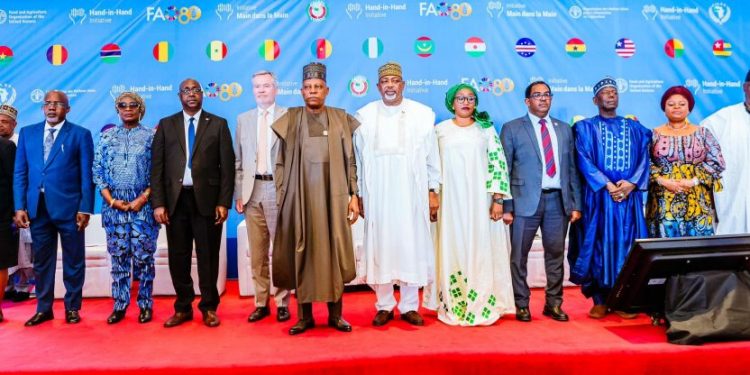The Federal Government announced new incentives on Tuesday to attract fresh investment into agriculture, pledging reforms that will expand irrigation, ease access to credit, and create millions of rural jobs under President Bola Tinubu’s economic agenda.
Vice President Kashim Shettima outlined the measures at the Food and Agriculture Organisation’s Hand-in-Hand Investment Forum in Abuja, describing hunger as “the great equaliser that reveals our vulnerabilities and the shared fragility of our existence.”
According to a statement by his media aide, Stanley Nkwocha, the incentives include single-window platforms for land registration, improved agricultural credit systems, large-scale mechanisation, and strategic irrigation projects.
Shettima said Nigeria has the capacity to irrigate more than three million hectares of farmland but currently uses less than 10 per cent of that potential. “Strategic investment in irrigation alone could triple yields, free us from seasonal dependency, and fortify our resilience against climate shocks,” he noted.
The Vice President added that agriculture is central to Nigeria’s 2021–2025 National Development Plan, which targets lifting 35 million people out of poverty, creating 21 million rural jobs and achieving food and nutrition sufficiency. He assured investors that regulatory reforms, public-private partnerships and agri-tech innovation would make the sector more attractive.
“Nigeria is open for business, and we are ready to partner with you,” Shettima said. “Let us build a Nigeria and a subregion where no one goes to bed hungry, where rural communities are hubs of wealth creation, and where agriculture is the true foundation of our prosperity.”
Minister of Agriculture and Food Security, Abubakar Kyari, also pointed to Nigeria’s large arable land, domestic market, and growing digital economy as unique advantages for agribusiness. Minister of Budget and Economic Planning, Atiku Bagudu, added that irrigation and agribusiness remain central to the country’s economic diversification agenda.
International stakeholders, including the FAO, the EU, and officials from The Gambia, commended Nigeria’s agricultural initiatives, citing progress in rice and cassava value chains as examples for the region. The EU announced fresh investment of over €80 million in value chain development across seven states.
The new push comes at a time when rising food prices, inflation, and climate shocks have intensified calls for long-term investment to strengthen Nigeria’s food security and reduce dependence on imports.










